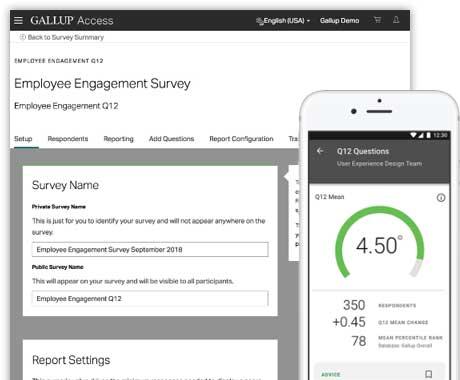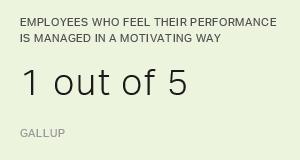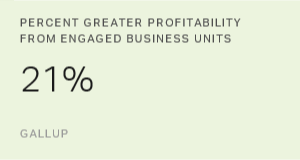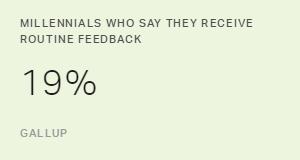Story Highlights
- Too many surveys can disengage workers
- HR doesn't have the time or bandwidth to sort the important from the unimportant
- Data should have a demonstrated, calculable effect on performance
Human Resource teams are being flooded with new tech offerings intended to collect and track employee data and feedback. Big data has become a big deal, even for HR.
And that's great. To a point.
Yes, tech budgets are well-spent if they reduce the many time-consuming tasks that plague HR professionals. But HR needs more from these tools and apps than clerical assistance -- they want a path toward improved performance, too.
Unfortunately, big data too often provides both too much and not enough -- too many numbers, not enough guidance.
The Problem With Too Much HR Data
The availability of real-time data can be a dazzling temptation. But a constant influx of data requires constant evaluation. This leaves HR sorting through it all to find meaning, purpose, and a way to apply it -- all while under a perpetual deluge of data.
The biggest issue with all of that "noise" is that too rarely do the data reflect insights into the level of engagement in the workplace. That's what HR -- and all leaders -- need to focus on, because nothing predicts performance like engagement. Engaged workforces outperform their peers by 147% in earnings per share -- and Gallup has discovered the 12 elements that can quantify it.
Of course, there are employee surveys available to purchase that run hundreds of questions deep -- HR can buy one and get organizational network analysis resulting in near-infinite data points. Identifying which few aspects of the data correlate with engagement can paralyze an HR department.
And that's not the only reason picking the right survey matters so much. Gallup scientists have long-warned that badly designed or poorly implemented surveys do more harm than good. Surveys that are too long or arrive too often are annoying. Annoyance can escalate to outright frustration if no visible action results from the requested insights. That tends to happen with surveys meant to garner general opinions, or give the appearance of concern, or ask about issues leaders really can't fix in the near term.
What's more, some forms of data collection are downright intrusive. HR can buy tech that monitors emails to detect and report negative emotions, or that alerts managers if workers don't go to the gym often enough, both of which may well make workers feel uncomfortable.
HR Data Doesn't Come With Enough Guidance
Meanwhile, there's a usage problem. Say HR gets all the right data that relates all the most important information and has disregarded the irrelevant (or borderline unethical) stuff. They still may not know what to do with the right data.
Without scientifically validated advice and analytics to use the data to improve performance, the data has very little functionality. There just isn't enough analytics or advice to put all the data to use.
It's easy to ask questions that are similar to Gallup's Q12 survey, or anything else on any other survey platform. But that leaves HR with a bunch of numbers and not enough knowledge to improve anything.
That's why Gallup Access -- our own analytics, advice and survey platform -- is built to support HR in a different way. Gallup spent 30+ years, leveraged the expertise of brilliant scientists in a variety of academic areas, and studied millions of individual contributors, managers, and leaders to identify the traits and capacities of the most successful people and companies in every industry all over the world. No HR team could possibly accomplish all that and no app can either. But all HR teams can access what Gallup learned -- and learn how to apply it in their own businesses.
Take our best friend question -- making improvements on this metric has been tied to fewer safety incidents. Workplace safety is important at every company, but it's critical at some -- think about how much can go wrong in hospitals, restaurants and construction sites. Given the importance of having a best friend at work, what's HR supposed to say to turn coworkers into best friends? If too few people have best friends at work, should HR create a kind of adult buddy system or use social media to identify and support burgeoning relationships? Both or neither? (Answer: neither.)
And if a big data firm does offer a how-to system for the data they provide, make sure it has a demonstrated and calculable effect on engagement and performance. If not, what's the point?
HR Needs Insights and Advice, Not Just Data
Gallup's purpose is to provide the research-based analytics and advice people and companies need. That's why we take data collection and dissemination so seriously. If it weren't for data, Gallup couldn't fulfill our purpose at all.
Decades of delivering on our mission proves that, to be blunt, there's a limit. There's a limit to the data that are related to performance, and a limit to the ability to use even the best data. There's also a limit to the amount of time and bandwidth available on any HR team -- demands that are heavy now and ever-increasing.
So, while the siren call of data and the promises it makes can be hard to resist, HR leaders need to be cautious of getting both too much and not enough -- too much information, not enough advice and analytics to improve performance.




